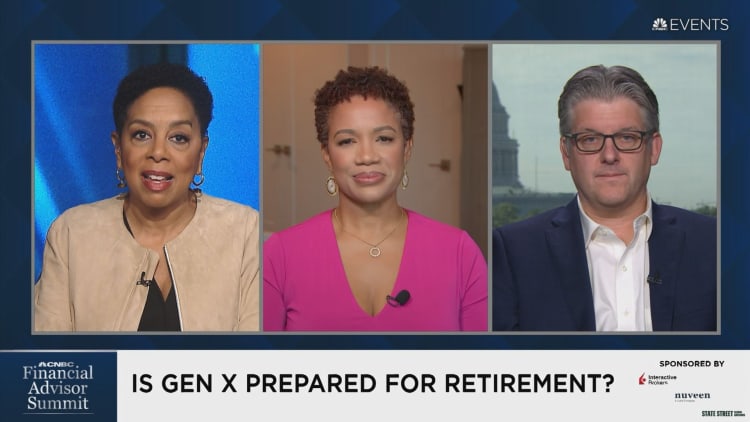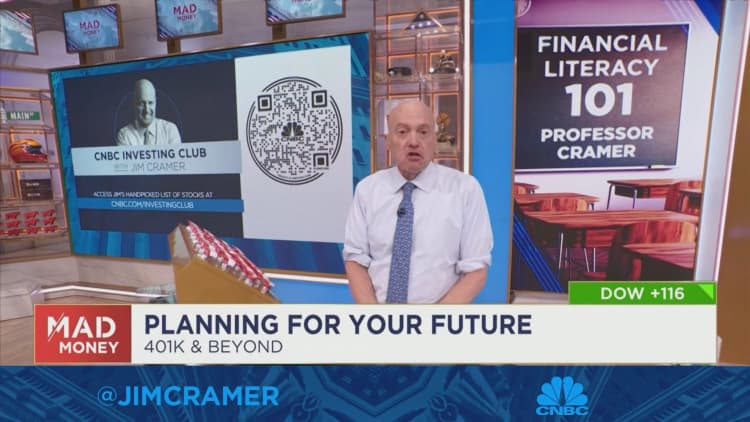More retirement savers have taken loans from their 401(k) accounts over the past year, suggesting that U.S. households are borrowing more readily as they feel the pinch of inflation, experts said.
"I think 401(k) loans — like credit card debt — are kind of leading indicators of economic stress in America," said David Blanchett, a certified financial planner and head of retirement research at PGIM, the asset management arm of insurer Prudential Financial.
"Individuals are having to tap their retirement savings because they have to pay for or pay back something," he added.
More from Personal Finance:
A 401(k) rollover is 'the single largest transaction' many investors make
Not saving in your 401(k)? Your employer may re-enroll you
These policy changes may help people get bigger Social Security checks
Households turn more to 401(k) loans
Workers generally can't touch their 401(k) savings without penalty before retirement age. Loans are one, but not the only, exception. Investors can borrow against their account balance and the loan, if repaid properly, is tax- and penalty-free.
Most but not all plans allow for them.
About 2.6% of savers, or roughly 138,000 people, took a loan from their workplace plan in the third quarter this year, borrowing an average $10,778, according to Empower, an account administrator, which analyzed its internal data on 5.3 million accounts. That share increased from 2.3% in Q3 2022 and 1.7% in 2020.

Similarly, Fidelity Investments, the nation's largest 401(k) administrator, saw 2.8% of savers, or 641,000 people, take loans in the third quarter, an increase from 2.4% during the same period last year.
About 17.6% of investors, or more than four million people, have an outstanding loan, said Fidelity, which analyzed 22.9 million accounts. That share has jumped from 17.2% in the second quarter and 16.8% in Q3 2022, according to the firm, which attributes the rising loan prevalence to "inflation and cost of living pressures."
401(k) loan amounts have grown, too
Inflation, which is a measure of how quickly consumer prices are rising, touched a 40-year high last year, though has since fallen significantly. The average American's earnings struggled to keep pace, equating to lost buying power for many.
"Heightened inflation over the last couple of years has hurt household finances," said Cathy Curtis, a certified financial planner and the founder and CEO of Curtis Financial Planning in Oakland, California.
"Regular income may not cover all the expenses if raises have not kept up with the increased cost of living," added Curtis, who is also a member of CNBC's Advisor Council.
401(k) loan amounts also seem to have jumped. The average worker took a $15,000 loan in 2022, which is up from roughly $10,000 to $11,000 between 2018 and 2021, according to the Plan Sponsor Council of America, a trade group, which recently polled employers sponsoring a total of 687 workplace plans.
401(k) loans are 'definitely better' than credit card debt
Americans have also turned to credit cards to cover their costs. Total credit card debt topped $1 trillion for the first time ever in Q2 2023.
There are 70 million more credit card accounts open now than in 2019, economists at the Federal Reserve Bank of New York wrote recently. Further, 69% of Americans had a credit card account in the second quarter, up from 65% at the end of 2019, the bank said.
I think 401(k) loans — like credit card debt — are kind of leading indicators of economic stress in America.David Blanchetthead of retirement research at PGIM
While households should try not to touch their retirement savings before old age, a 401(k) loan is a "relatively attractive place" to get fast cash for those in a pinch, Blanchett said.
"It's definitely better than, say, credit card debt," he added. "You don't want to take on loans, to the extent you can [avoid it]. But there are better places to get them than others."
Unlike credit card and other debt, savers who borrow from their 401(k) pay themselves back with interest. Interest rates are also generally much lower than those of credit cards, which are currently at a record high over 21%.

Many times, households use 401(k) accounts for a down payment on a new home, Curtis said. As mortgage rates have soared, down payments have increased — meaning a bigger 401(k) withdrawal would be required, Curtis said.
Average rates on a 30-year fixed-rate mortgage are more than 7% today, up from around 3% for most of 2020 and 2021, according to Freddie Mac data.
Nationwide, the median down payment was more than $30,000 in Q3 2023, nearly 15% of the average purchase price, a record high, according to Realtor.com. Those figures are up from about $22,000 and 12.5% in 2021.
When a 401(k) loan may be a good idea
401(k) loans may make sense in a few circumstances, Curtis said.
For example: if a financial lifeline is needed for an essential expense such as a medical emergency, and a 401(k) loan were to help avoid high-interest debt. Additionally, a loan can help cover a down payment if other savings aren't available, Curtis said.
"The loan can be considered an investment in an asset that can grow," she said.
The downsides of 401(k) loans
There are also some instances in which a 401(k) loan may be a poor idea.
For one, it may be risky for those with insecure jobs, Curtis said. If a borrower leaves a job due to a layoff, for example, the loan often needs to be paid in full within a shortened time frame. These provisions differ from plan to plan. If a borrower is unable to make that payment, it may become considered a withdrawal, and therefore subject to income tax and tax penalties.
Withdrawing money may also affect long-term retirement savings, Curtis said. Borrowed money isn't invested in the market, so savers miss out on potential growth, she said.
Most but not all 401(k) plans allow investors to continue saving even if they have an outstanding loan, Blanchett said.
It can be in savers' best interest to do so, especially if they get an employer match, he said.
Don't miss these stories from CNBC PRO:
- Saudi Arabia is struggling to boost oil prices, raising possibility of supply war with U.S.
- Here's where to invest $250,000 for the next 5 years
- Citi is so bullish on this biotech stock it gives it 800% potential upside
- 'It's beginning to look a lot like VIX-mas.' What Wall Street's fear gauge is saying right now






